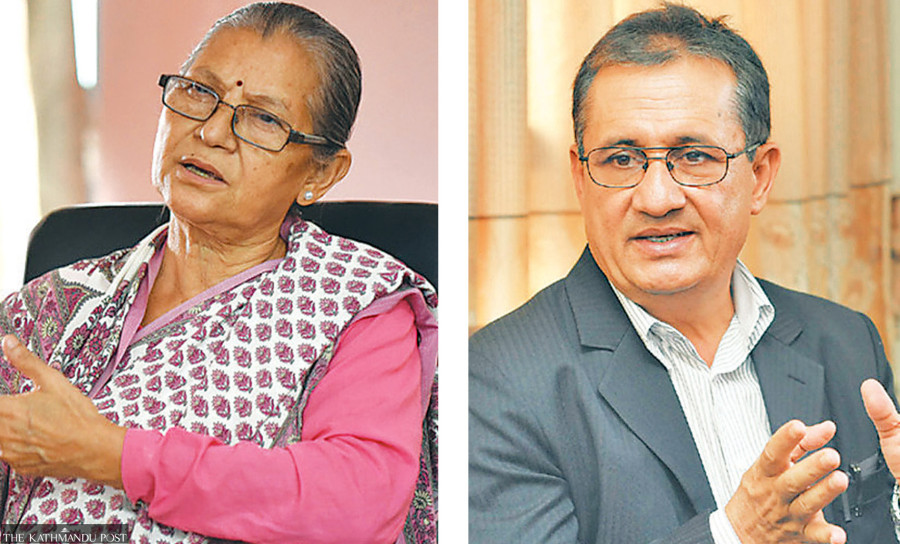Politics
Shakya and Acharya may lose chief minister posts if they remain in UML
With some UML assembly members defecting to CPN (Unified Socialist), Oli supporters could slip into minority.
Tika R Pradhan
The two remaining chief ministers of the CPN-UML are set to lose their positions with 12 members of the Bagmati Province and 10 members of Province 1 defecting to Madhav Nepal’s CPN (Unified Socialist). This will strip the party led by former prime minister KP Sharma Oli of leadership positions in four provinces that it held for over three-and-a-half years.
As many as 12 members of the Bagmati Provincial Assembly, who were elected on CPN-UML tickets, defected to the CPN (Unified Socialist) on Tuesday, pushing the recently appointed Chief Minister Asta Laxmi Shakya into minority.
“A dozen members of the provincial assembly including a minister have notified the provincial office of the Election Commission that we are with the CPN (Unified Socialist),” said Basanta Manandhar, a member of the Provincial Assembly.
While at least 10 UML members of Province 1 Assembly are preparing to join the CPN (Unified Socialist) on Wednesday.
In a bid to save his position, the newly-appointed chief minister of Province 1, Bhim Acharya, had a few days ago managed to bring two leaders close to Madhav Nepal—Bal Bahadur Samsohang and Laxman Tiwari — to his fold and made them ministers. However, Acharya will fall into minority if five provincial members defect to the CPN (Unified Socialist).
“At least 10 members of the provincial assembly will declare their affiliation to the CPN (Unified Socialist) on Wednesday at the provincial office of the Election Commission,” said Rajendra Rai, a central committee member of the CPN (Unified Socialist), who has been proposed as the new chief minister candidate. “We were planning to notify the office today itself but due to a public holiday in our province it has been postponed till Wednesday.”
Among the four chief ministers elected from the CPN-UML, who are close to Oli, two have already been ousted with the alliance of five parties garnering the majority both at the federal government and the provinces. Oli’s confidant Prithvi Subba Gurung lost the Gandaki chief minister position on June 12.
After Gurung, Oli himself was replaced as prime minister by Nepali Congress President Sher Bahadur Deuba on July 13.
Around a month after Oli’s ouster, it was time for another of his close aides, Shankar Pokhrel, to go. He was replaced by Maoist Centre’s Kul Prasad KC on August 12.
But UML Chairman Oli tried to play a trick in both the remaining provinces—Province 1 and Bagmati—by replacing chief ministers Sherdhan Rai and Dormani Poudel, with leaders, who used to be close to Madhav Nepal and had been vying for the provincial posts.
A day before Madhav Kumar Nepal went to the Election Commission to apply for a new party, UML Chairman Oli, in a dramatic move, had replaced the Bagmati chief minister with his party’s vice-chair Asta Laxmi Shakya.
Surprising everyone in the party and outside, Shakya, a longtime ally of Madhav Nepal and a strong critic of Oli’s moves, on August 18 readily became chief minister of Bagmati, a post she had been eyeing since her election as a provincial assembly member in 2017. Shakya had agreed to contest the provincial assembly elections after she was promised the chief minister position, but Oli, having secured a majority for his faction in the UML provincial Parliamentary Party, used a vote to elect Paudel, his confidant, as chief minister.
Shakya had appointed two ministers after she took charge of office. But one of them—Social Development Minister Krishna Khanal—has defected to the CPN (Unified Socialist).
In Bagmati, the 110-member strong assembly after the death of UML member Pashupati Chaulagain has 109 members. Shakya needs 55 members for a simple majority but with 12 members among the UML’s 56 members defecting to the new party she now has the support of only 44 members. CPN (Unified Socialist) has proposed its leader Rajendra Pandey for new chief minister of the province and is holding talks in the five-party alliance. In the assembly, the Maoist Centre has 23, Nepali Congress 22, Bibeksheel Sajha 3, and the RPP and Nepal Workers and Peasants Party have two each members besides one independent.
Similar was the case with Bhim Acharya, who was close to Madhav Nepal and Jhala Nath Khanal. He was defeated by Sherdhan Rai in the election for the Parliamentary Party leader of Province 1.
Since then Acharya had not given up his claim to the post. Lately in negotiations with Oli, Acharya had got the assurance that he would replace Rai as chief minister if he lobbied for party unity.
A day after Madhav Nepal supporters registered CPN (Unified Socialist) with the Election Commission, Acharya was appointed on August 26 with the hope that he would stop the provincial members from joining Nepal’s party.
The 93-member Provincial Assembly currently has 92 members after a Maoist Centre member lost position for having defected to the UML. Acharya needs 47 members to win a majority but among 51 members of the CPN-UML including the Speaker and one member charged with criminal offence—the party will only have 49 members who can vote. Even if five members stand with the Unified Socialist, Acharya will slip into minority.
Coalition partners in the federal government—Nepali Congress, CPN (Maoist Centre), CPN (Unified Socialist) and Janata Samajbadi Party—are working to expand the Cabinet to give it a full shape.
Currently Nepali Congress has 21 seats, Maoist Centre has 15, and Janata Samajbadi Party has 3 seats, Sanghiya Loktantrik Rastriya Morcha and RPP have one each member in the province.




 8.79°C Kathmandu
8.79°C Kathmandu














